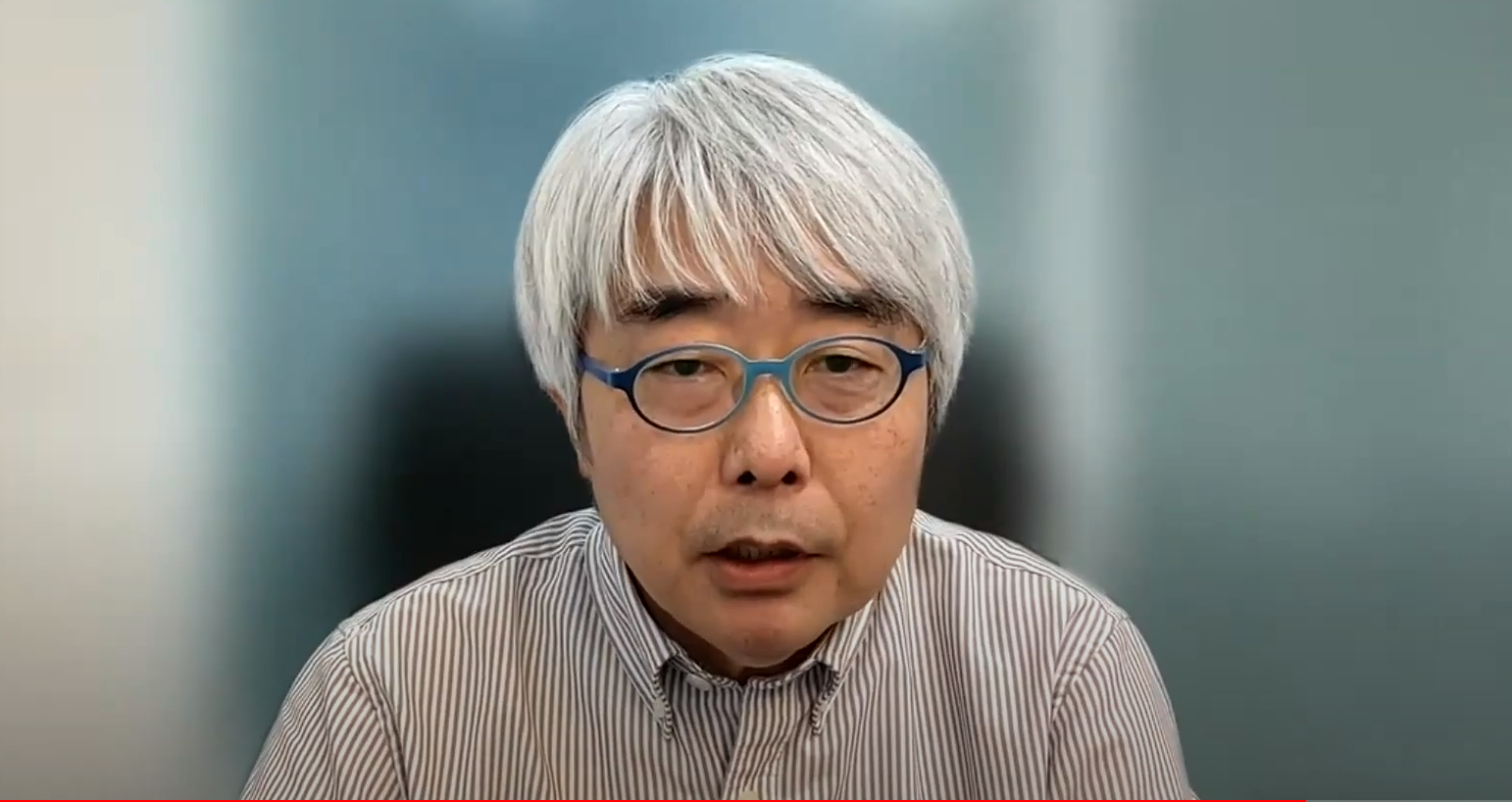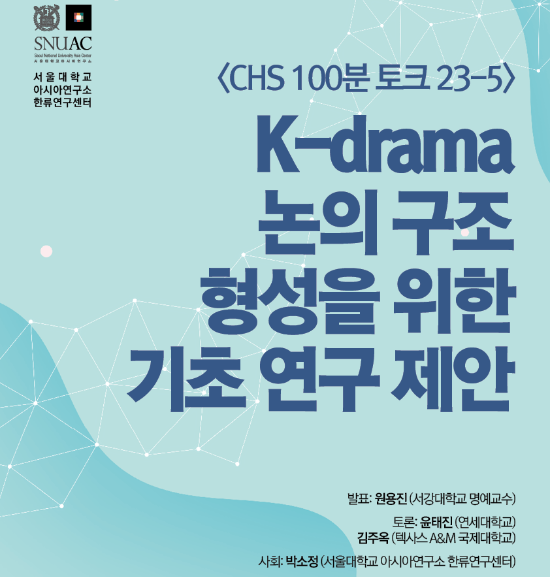[Event] K-drama and Korean studies, similarities and differences
Professor Won said, "Coincidentally, thanks to the Korean Wave (Hallyu), there is a heightened interest in Korea's modernity, the encounter between Korea's modernity and tradition, and especially in everyday life through Hallyu-related research.
Author | Sae won Kim (Research Associate, Seoul National University)


As K-dramas have gained worldwide success and attention, it has been said that research on K-dramas will open a new chapter in Korean studies. Professor Yong-jin Won, an emeritus professor at Sogang University, revealed this on September 25 at a book talk event titled "A Preliminary Research Proposal for Establishing the Discussion Structure of K-Drama," hosted by the Center for Hallyu Studies at Seoul National University Asia Center. The book discussion, moderated by Sojeong Park, a Research Fellow at the Center for Hallyu Studies, was attended by Professor Tae Jin Yoon of Yonsei University and Professor Ju Oak Kim of Texas A&M International University, who engaged in an in-depth discussion on the direction of K-drama research.
According to Professor Won, discussions on K-dramas do not have a specific academic origin or field. As a result, K-dramas have been studied in various ways by scholars from various fields such as communication, anthropology, sociology, and Korean studies, rather than being confined to a specific field. Among them, Korean studies, which has long been called "national studies," has faced the limitation of not being able to break away from traditional academic fields. However, Won explained that research on K-dramas can help Korean studies break out of the confines of archaeological research. In addition, Won said that the interest in modern Korean everyday life and private life in general that K-dramas have generated could in turn provide an opportunity to shed new light on Korea's traditions.
K-dramas in the context of Korean studies
Professor Won said, "Coincidentally, thanks to the Korean Wave (Hallyu), there is a heightened interest in Korea's modernity, the encounter between Korea's modernity and tradition, and especially in everyday life through Hallyu-related research. He argued, "Through the everyday life depicted in dramas, Korea's storytelling, the way Koreans use media, fandom, and the way dramas are received, there is an opportunity to gain insights into Korea's modern life or everyday routines."
Won continued, "The point is not that drama studies should simply advance Korean studies, but that it might be able to do so. He added, "Drama research could potentially enhance Korean studies, and while Korean studies has been archaeological in nature, drama research can provide a more contemporary academic perspective." In line with this, he emphasized the need for research on K-dramas to become more systematic and refined.
On the other hand, Professor Tae Jin Yoon, who participated in the event as a respondent, pointed out the realistic limitations of Korean studies and the problems of Hallyu research from the perspective of Korean studies. He said, "Speaking mainly of the U.S., the growth of Hallyu is expanding the field of Korean studies itself. However, he added, "Still, whether it's the curriculum in schools, research areas, or even hiring new professors, the main focus is Korean language, Korean literature, Korean history, followed by Korea's international politics. For practical reasons, you cannot teach on the basis of Hallyu alone."
Yoon went on to say, "In Korean studies, Hallyu research based on literature or political science is underway, and those who study film or popular culture sporadically research or present Hallyu within their own fields, such as communication, anthropology, or sociology. He pointed out, "It may be difficult to overcome the perspective of Hallyu as a unique aspect of Korean studies within national studies. I'd like to raise the question: does researching Hallyu mean researching Korea, and is it desirable to do so?"
Yoon "Transnational Phenomenon"
Professor Yoon emphasized the need to approach K-dramas not as a part of Korean studies, but as a transnational phenomenon, similar to cultural phenomena that have previously attracted global attention, such as Latin America's telenovela, India's Bollywood, and the Hong Kong noir craze. He also mentioned the importance of studying K-dramas as a transnational cultural phenomenon, especially in the current global situation where there is a strong movement toward de-globalization.
Yoon said, "There is an ongoing tendency for countries to homogenize into an exclusive nation-state system, including Brexit and the Russian war. In such a situation, the study of K-dramas as a supranational cultural phenomenon can contribute to the current separation of politics and culture." He added, "Ultimately, research on K-dramas should not only be part of Korean studies, but also expand its focus to the supranational aspect of drama and its significance."
Professor Ju Oak Kim, who participated in the discussion alongside Professor Yoon, also commented, "The direction of looking at K-dramas from the perspective of area studies is different from that of media or cultural studies, or even anthropology. There are clear differences in perception and methodology that can lead to significant problems arising from unrelated aspects. In order to advance the discourse on K-dramas, a more active exchange is needed."
Kim also emphasized, "Students have a strong desire to learn and a high level of understanding about the overall historical landscape or the development of K-dramas, but there are not many research books to match. The younger generation is much more open, willing to learn, and has a higher level of understanding, but we still have a lot of work to do in terms of providing research that can match these qualities."
During the event, Professor Won organized the types of K-dramas and presented different types of dramas based on the types of directors and production companies. In addition, he raised 14 research topics related to K-dramas, including genre differences in dramas resulting from traditional differences between film and television, the impact of the emergence of online video streaming services (OTT platforms) led by Netflix, and other changes in the landscape of K-dramas. In addition, various opinions were exchanged during the event on topics such as the studioization of dramas, the relationship between webtoons and K-dramas based on transmedia storytelling strategies, the identity of K-dramas, and the drama industries in Thailand and China.
![[분석] OTT 시대의 막장, 왜 반복되는가 ― 감정의 알고리즘과 욕망이 설계되는 방식](https://cdn.media.bluedot.so/bluedot.kwave/2025/12/p2hxlj_202512201852.jpg)
![[연구] 넷플릭스 한국 진출 10년을 돌아보다: ‘약한 고리 깨기’에서 ‘원숭이 꽃신’까지](https://cdn.media.bluedot.so/bluedot.kwave/2025/12/nijw81_202512140459.jpg)